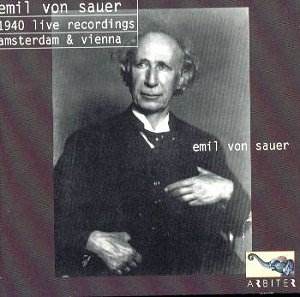It has been a bumper time recently for Emil von Sauer.
Marston brought out his complete commercial discs on three CDs and Arbiter
has released this truly remarkable disc of his 1940 live performances.
Sauer (1862-1942) was a pupil of Nicholas Rubinstein – brother of Anton
– and Sauer never ceased singing his praises as a pedagogue par excellence.
Sauer subsequently joined the Liszt circle, taking part in the 1884
classes and began his career the following year with a Berlin debut.
That career lasted for not far short of sixty years and listening to
these frankly astounding performances one can hear very little diminution
in digital flexibility, much less accuracy, his technique remaining
in well nigh unimpaired condition.
The Austrian (RAVAG) radio recital of 1940 was recorded
and stored before being carried away as war booty by the Russians in
1945. Most of the pieces are new to Sauer’s discography. As for the
Schumann Concerto, this was the last work Sauer performed, two years
later with Knappertsbusch conducting the Vienna Philharmonic. Here he
has the riveting support of Mengelberg. Taking this first and even knowing
of Sauer’s reputation for technical fluency and expressive nuance –
also a sense of space and depth in his performances of the Liszt concertos,
which are quite leisurely – I was still astonished by the performance
of the 78 year old as he and Mengelberg launch one of the most magical
and winning performances of the Schumann I’ve ever heard. Note writer
Allan Evans characterises it as "relaxed and dramatic" and
that is a well-chosen and apposite phrase, emphasising that the former
need not be dissociated from the latter. Sauer’s judicious weight and
chordal timing in the Allegro affettuoso is notable, Mengelberg’s astounding
orchestral accelerando jet propelled, exuding remarkable animation and
rhythm. Sauer is glorious in his colour as are the wind principals at
c3.20 as the pianist slows at the climax. He is tremendously graceful
in the intermezzo – Mengelberg bringing out the affectionate string
and oboe’s moulded phrases and in the finale there is a buoyancy, an
airborne lightness and freedom that is frequently intoxicating. The
occasional idiosyncrasies may not be to all tastes but I found them
utterly delicious and impossible to resist.
The Austrian recital approximates pretty accurately
to a Sauer concert recital. Thus his Schubert Impromptu is played in
the Liszt edition in G major (not G flat) and is a master class in voicings,
vibrant and liquid – with the added chordal and harmonic transpositions
prominent. His Chopin Bolero is winning and delightful, the Nocturne
limpidity itself with delightful little hesitations. In the C minor
Etude there is marvellous insight and control, full of lucidity and
sonorous clarity, a myriad of perceptible voicings. The Schumann Traumeswirren
is filigree, with quick and unimpeded finger work from Sauer as he conveys
the humour and winsome frivolity with maximum wit. He was a champion
of Sgambati whose Piano Concerto he’d performed in Rome under the composer’s
direction. The Minuetto vecchio is full of charm and generous lyricism,
rolled chords imparting an antique air and wit, Sauer showing just how
morceaux such as this can be given breathtakingly characterised life
without either specious ostentation or undue glamour. His own Sonata
is a little nine-minute compound of Schumann and Sgambati. The Spieluhr
second movement is a capricious one with filigree treble games and "musical
box" sonorities and the finale a glittering showpiece full of finger
clarity and finesse – and sheer charm.
As you can tell I was entirely captivated by this disc.
The sound is quite unproblematic and the descriptive and biographical
notes splendid. But then the whole thing is splendid and those interested
in piano performance practice would be ill advised to pass this by.
Sauer was self-evidently one of the giants, a true poet, and these live
performances attest to the lyricism and beauty that mark out one of
the elite.
Jonathan Woolf
